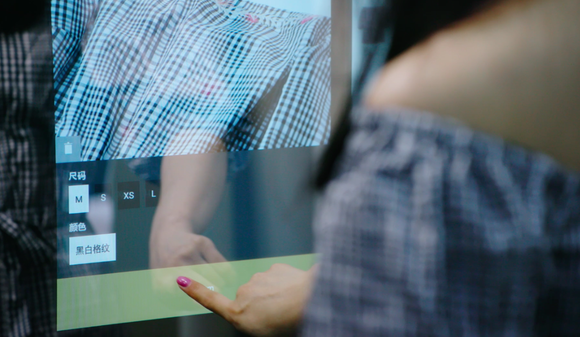Alibaba's New Retail Investments Bring AI to Fitting Rooms
People who know Alibaba (NYSE: BABA) only as one of China's largest online retailers may be surprised to learn that it has been focusing for the past few years on updating brick-and-mortar stores for the digital era. Its latest move in that direction: incorporating artificial intelligence technology into clothes shopping.
Earlier this month, the Chinese e-commerce giant opened its first "FashionAI" concept store for a long weekend at Hong Kong Polytechnic University. While the high-tech store had a limited test run, Alibaba sees it as a taste of things to come.
Alibaba is betting big that people still value the in-store experience when it comes to things like trying on clothes or testing out electronics. The company's executives often point out to investors that 80% of shopping in China is still done in physical stores, and it wants to capture a piece of that market, too.

Alibaba is introducing new technology to stores. Image source: Alibaba.
Making clothes shopping more enjoyable
The FashionAI store was an experiment in combining the best aspects of offline and online clothes shopping. Customers were able to try on items in different sizes and colors, while also using technology to speed the process up, and to help them choose outfits.
Customers who walked into the store could check in using their Taobao e-commerce app. As they browsed, they could use it to put clothing items they liked into a "virtual bag." Store employees would then use QR codes to find those specific items in the correct size, and have them ready for them to try on in a dressing room. If a customer wanted a different size or color, they could use an AI interface on the dressing room mirror to alert store staff. The AI system also pulled up accessory suggestions for their outfits.
Alibaba plans to extend similar AI tools to Taobao app
The most important takeaway from this tech-heavy apparel store's debut is that Alibaba also plans to release a "virtual wardrobe" feature on its Taobao app that would keep a history of the items you've tried on in-store, so you can easily buy them even after you leave. It's clearly easier to impulse-buy online when you only have to click a few buttons to purchase precisely what you're looking for -- and that's something Alibaba wants to encourage.
The feature will also analyze the contents of your virtual wardrobe, and suggest complementary clothing and accessory items from other brands on its two shopping sites, Taobao and Tmall. If this works as intended, it should lead not only to sales of items customers had originally hesitated to buy in-store, but to additional purchases as well.
It's another way for Alibaba to drive up its online retail sales, and to induce its 617 million monthly active users to spend more time and money in its ecosystem.
Pushing the New Retail strategy
Shareholders should be pleased with Alibaba's FashionAI project because it demonstrates that the company is continuing to invest in its "New Retail" strategy. At stores that have undergone Alibaba's New Retail transformation, customers can do things like scan items' QR codes for detailed information about them, pay using facial recognition, and order products to be sent directly to their homes.
By continuing to improve the physical store experience, Alibaba is increasing its ability to access the brick-and-mortar sales that it was missing out on as just an online retailer. During the company's last earnings call, Executive Vice Chairman Joe Tsai told investors that its goal was to digitize China's entire retail market, which would make Alibaba's total addressable market all of China's $5 trillion retail market.
Alibaba's other New Retail projects, which include Hema supermarkets and Intime department stores, are starting to make the company money. Last quarter, Alibaba said the 56% revenue growth in its China commerce retail segment was largely a reflection of the growth in its New Retail projects.
However, these store transformations don't come cheap, and the related outlays contributed to Alibaba's net income drop and shrunken operating margin last quarter. The company was unapologetic about its spending habits, though, and warned investors that it planned to continue heavy investment in its New Retail, cloud computing, and logistics initiatives.
Alibaba firmly believes that all this spending will pay off in the form of a more diversified revenue base, and a user-friendly ecosystem that encourages customers to spend more.
In China's fiercely competitive e-commerce space, even the leaders can't rest on their laurels.
More From The Motley Fool
Natalie Walters has no position in any of the stocks mentioned. The Motley Fool has no position in any of the stocks mentioned. The Motley Fool has a disclosure policy.

 Yahoo Finance
Yahoo Finance 